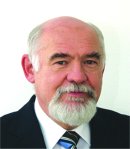|
Plenary
Lecture
Aggregation in Intelligent Systems

Professor Imre J. Rudas
Rector
Obuda University, Hungary
E-mail:
rudas@uni-obuda.hu
Abstract: The problem of aggregating information
represented by fuzzy sets in a meaningful way has been
of central interest since the late 1970s. In most cases,
the aggregation operators are defined on a pure
axiomatic basis and are interpreted either as logical
connectives (such as t-norms and t-conorms) or as
averaging operators allowing a compensation effect (such
as the arithmetic mean).
On the other hand, it can be observed by some empirical
tests that the above-mentioned classes of operators
differ from those ones that people use in practice.
Therefore, it is important to find operators that are,
in a sense, mixtures of the previous ones, and allow
some degree of compensation.
This talk summarizes the research results of the author
and his co-workers that have been carried out in recent
years on generalization of conventional aggregation
operators. This includes, but is not limited to, the
class of uninorms and nullnorms, absorbing norms,
distance- and entropy-based operators,
quasi-conjunctions and nonstrict means.
Brief Biography of the Speaker:
Imre J. Rudas graduated from Banki Donat Polytechnic,
Budapest in 1971, received the Master Degree in
Mathematics from the Eotvos Lorand University, Budapest,
the Ph.D. in Robotics from the Hungarian Academy of
Sciences in 1987, while the Doctor of Science degree
from the Hungarian Academy of Sciences in 2004. He
received his first Doctor Honoris Causa degree from the
Technical University of Kosice, Slovakia and the second
one from “Polytechnica” University of Timisoara,
Romania.
He is active as a full university professor. He served
as the Rector of Budapest Tech from August 1, 2003 for a
period of four years, and was reelected for three years
in 2007. From 2010 Budapest Tech is changed to Obuda
University and he was elected as the rector for five
years.
He is a Fellow of IEEE, Senior Administrative Committee
member of IEEE Industrial Electronics Society, member of
Board of Governors of IEEE SMC Society, Chair of IEEE
Hungary Section and Vice-President of the Hungarian
Academy of Engineering.
He is the treasurer of IFSA (International Fuzzy System
Association), he had been the President of Hungarian
Fuzzy Association for ten years.
He serves as an associate editor of some scientific
journals, including IEEE Transactions on Industrial
Electronics, member of editorial board of Journal of
Advanced Computational Intelligence, member of various
national and international scientific committees. He is
the founder of the IEEE International Conference Series
on Intelligent Engineering Systems (INES) and IEEE
International Conference on Computational Cybernetics (ICCC),
and some international symposia. He has served as
General Chairman and Program Chairman of numerous
scientific international conferences.
His present areas of research activity are Computational
Cybernetics, Robotics with special emphasis on Robot
Control, Soft Computing, Computed-aided Process
Planning, Fuzzy Control and Fuzzy Sets. He has published
books, more than 450 papers in books, various scientific
journals and international conference proceedings. He
received more than 600 citations for his publications.
|
